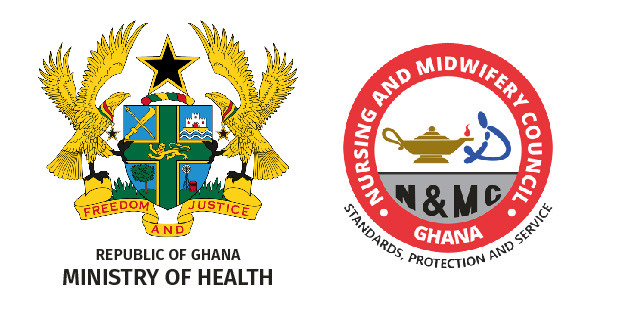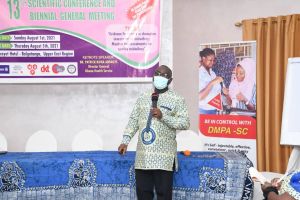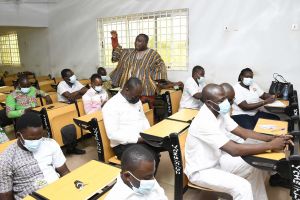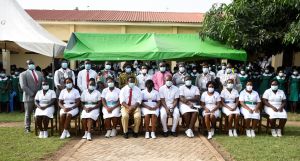

NMC-GH
GHANAIAN-DIASPORA NURSING ALLIANCE LAUNCHED

The Ghanaian-Diaspora Nursing Alliance (G-DNA) has been launched in Accra with the aim of serving as a bridge between Ghanaian nurses living and working in Ghana, and those in the diaspora.
Prof. Yvonne Commodore-Mensah, the president of the G-DNA who is an Associate Professor at the Johns Hopkins Schools of Nursing and Public Health in Baltimore in her address said she hopes that the alliance will advance the work of nurses in the country.
She stated that the Ghanaian-Diaspora Nursing Alliance is to create local to global collaboration between nurses in Ghana and their counterparts in the Diaspora.
The Chairman of the occasion, Dr. Patrick Kumah Aboagye, the Director General of Ghana Health Service said Nurses with Advanced Certificates will be promoted to make up for Europe migration. According to him, several professional nurses are migrating to Europe. This is reducing the number of professional nurses in the country.
He said that the situation has forced the Service to devise urgent measures to ensure that it augments the numbers and ensure that the country is not fully deprived when it comes to the roles that these professional nurses play in the healthcare sector. Dr. Patrick Kuma-Aboagye added that the GHS is also working alongside other institutions to be able to put together the exact data on the impact of these migrations by the nurses.
He also stated that they are ensuring that all nurses who have legally acquired certificates in advanced studies are assessed and properly promoted so as to help with the situation.
The Acting Registrar, Mrs. Philomina Woolley in her goodwill message pledges the Council’s allegiance to support the Alliance in whatever way so as to achieve their aim.
Members of the G-DNA Executive Board are Prof. Yvonne Commodore-Mensah, President and Co-Founder; Dr. Matilda Decker, Vice President and Co-Founder; Dr. Ruth-Alma Turkson-Ocran, Executive Director; Dr. Daniel Apau, Co-Director of Education; and Irene Fankah, co-Director of Eduction.
The rest are Evelyn Amoako, Ghana Liaison; Thomas Hinneh, Co-Director of Research and Quality Improvement; Angela Agore, Co-Director of Ressearch and Quality Improvement; Jacqueline Idun, Public Relations Officer; and Josephine Agyei, Social Media Manager.
The group also has 10-member Advisory Council including Victoria Bubunyo Bam, President, Associate Professor at the Ghana College of Nurses and Midwives; Eva Mensah, Director of Nursing and Midwifery Service, Ghana Health Service; Philomina Woolley, Ag. Registrar, Nursing and Midwifery Council; and David Tenkorang-Twum, Secretary, GRNMA.
The others are FlorenceNaab, Dean of UG School of Nursing and Midwifery; Nancy Reynolds, Associate Dean of Global Affairs, John Hopkins School of Nursing Center for Global Initiatives; Veronica Dzomeku,Dean, Faculty of Allied Health Sciences, Dept. of Nursing and Midwifery, KNUST; Perpetual Ofori-Ampofo, President, GRNMA; Prof. Lydia Aziato, Vice Chancellor, University of Health and Allied Sciences; and Hannah Acquah, Rector, Ghana College o Nurses and Midwives
REGISTRAR AND TEAM VISIT STAFF AT THE UPPER EAST REGIONAL OFFICE
The Registrar, Mr. Felix Nyante, Deputy Registrar,Mrs. Philomina Woolley and some Senior Officers of the Council have paid a day’s working visit at the Council's Office in the Upper East Region.
Addressing the Staff, the Registrar disclosed that the visit was to familiarize and be apprised with conditions under which the staff worked at the regional office.
He emphasized that " Management will consider the state of affairs at the regional office when planning and strategizing for the use of the Council's limited resources”.
A CALL FOR ACTION FOR IMPROVED MIDWIFERY TRAINING AND PRACTICE
Nursing and Midwifery practice and education reforms are one of the major priority areas in the 2021-2025 strategic plan of the Council.
To this end, the Council has set out to do the following:
1. Develop an MoU with the Ghana College of Nurses and Midwives to undertake joint research for midwifery development.
2. Set up Midwifery endowment fund and develop research agenda for the profession.
3. Publish midwifery research in the Council's peer-reviewed journal.
The Registrar of the Nursing and Midwifery Council, Mr. Felix Nyante made this known when he addressed the 13th Scientific Conference and Biennial General Conference of the Ghana Registered Midwives Association (GRMA) held in Bolgatanga, Upper East Region on Monday, August 2, 2021.
The programme was on the theme: “Evidence from data to champion investments in midwifery; Monitor the investments for quality midwifery.”
Mr. Nyante emphasised that there was the need for a continued and stronger partnership with the Council's health partners to invest heavily in the midwifery training and practice for improved service delivery.
He urged the leadership of GRMA to develop strategic goals that were in line with the 4th Industrial Revolution
C.K TEDAM UNIVERSITY OF TECHNOLOGY AND APPLIED SCIENCES (CKT-UTAS) SET TO INTRODUCE NURSING AND MIDWIFERY PROGRAMMES
The CKT-UTAS is preparing to introduce nursing and midwifery programmes as part of its running programmes.
This development will bring joy to the people of Upper-East region especially Navrongo as it will offer the opportunity for new students and practitioners the platform to acquire nursing and midwifery training and education.
In view of this, the Registrar of the Nursing and Midwifery Council led a team to the University to discuss the development of the curriculla for the nursing and midwifery programmes.
Mr. Nyante stressed on the need for the curriculla to be developed to employ interactive, inclusive and innovative teaching and learning techniques.
He thanked the Vice Chancellor and his team for the strong collaboration between University and the Council .
The Vice Chancellor of the University, Prof. Eric Magnus Wilson said the introduction of the nursing and midwifery programmes will
strategically position nurses and midwives to contribute significantly to the achievement of Sustainable Development Goal (SDG) 3 in the region and Ghana at large.
Present at the meeting were the Acting Heads of the Nursing and Midwifery Programmes and some Management Members of the University.
N&MC IN TALKS WITH UDS TO SET UP SATELLITE CAMPUSES IN YENDI AND GUSHEGU FOR NURSES AND MIDWIVES
Mr. Felix Nyante, Registrar of Nursing and Midwifery Council has announced that the Council is in talks with the University of Development Studies, Tamale and particularly the School of Nursing and Midwifery to set up satellite campuses for practitioners in the Yendi and Gushegu Districts.
Mr. Nyante stated that one of the reasons that informed the discussion to establish the campuses in those areas was not only to make nursing and midwifery education accessible to the people alone but to cut down the hectic time students went through by travelling for long distances in search of tertiary education.
Mr. Nyante made this known at separate Staff durbars at the district hospitals in Yendi and Gushegu.
The Dean of School of Nursing and Midwifery, University of Development Studies, Dr. Vida Yakong in her address via telephone stated that the plan to set up campuses in various strategic places would allow practitioners to upgrade their nursing and midwifery education and also make it more accessible to the practitioners.
She emphasized that more training programmes will be rolled out to offer solutions to the myriad of health challenges facing the country.
REGISTRAR INTERACTS WITH STUDENTS AND STAFF IN YENDI AND GUSHEGU
As part of an operational visit, the Registrar of the Council, Mr. Felix Nyante and some Senior Staff of the Council held separate Staff and Student durbars to discuss issues relating to the regulation of nursing and midwifery training and practice.
Mr. Nyante and his team first visited the Nursing and Midwifery Training College and the district hospital in Gushegu. The team later visited the College of Health Sciences and the district hospital in Yendi.
He used the opportunity to sensitize them on the digitization of the Patient and Family Care Study which will commence this year with the Registered Mental Health Nursing candidates.
He also encouraged them to abide by the principles of clinical and academic leadership.
Staff who accompanied the Registrar also took turns to speak on issues such as Therapeutic communication in nursing and midwifery care, introduction to the NMC Mobile, Continuing Professional Development programmes, indexing process and professional competencies of nursing and midwifery practitioners.
He was then accompanied by the Principal of the School to pay a courtesy call on the Gushegu-Na where he appealed to the Chief to provide land title documentation for the school to secure their land and prevent encroachers from developing structures on the school’s land.
At Yendi, the Registrar and his team together with the Principal and some Tutors of the College of Health Sciences paid a courtesy call on the Overlord of Dagbon, Yaa-Naa Abubakari Mahama II at his palace
Registrar appeals for infrastructural development for CoHS in Yendi from Ya-Na
The Registrar of the Nursing and Midwifery Council, Mr. Felix Nyante, last Wednesday paid a courtesy call on the Overlord of Dagbon, Yaa-Naa Abubakari Mahama II at his palace
in Yendi.
The Registrar was accompanied by some senior Staff of the Council, Principal and some Tutors of the College of Health Sciences (CoHS)in Yendi.
The visit to Yendi was part of the Registrar’s operational visit to the Nursing and Midwifery Training Institutions in Yendi and Gushegu. He also visited the District Hospitals in the two places.
Mr. Nyante briefed Ya-Na Abukari Mahama II about his visit to the Dagbon land. He held a fruitful discussion with the Overlord and his elders.
He informed the King that, the College of Health Sciences in Yendi needed to undergo infrastructural development and requested that he used his office to reach out to benevolent organizations as well as the Presidency to develop the College to make the teaching and learning environment extraordinary.
He additionally appealed to the King to provide the school with land title documents to secure their land and protect it from encroachers.
Mr. Nyante assured the King of the Council’s maximum cooperation since he (King) had made it clear he would support the College to train more nurses and other health professionals.
Ya-Na Abukari Mahama II assured the Registrar that he would consider his appeal and ensure that his secretariat works with the authorities in the school to get their land documentation done.
The Registrar was presented with a hand-woven batakari as a gift from the King.
N&MC STAGES SENSITIZATION SESSIONS FOR RMN CANDIDATES
The Council has taken its sensitization drive on the Digitization of the Patient and Family Care Study to the Nursing Training College in Pantang.
The sensitization drive forms part of series of public education programmes on Digitizing the Patient and Family Care Study.
The Council had earlier visited the Nurses Training College in Ankaful where students and Staff were sensitized on the new development.
Addressing the staff and students at a durbar, the Registrar said nursing and midwifery students, especially Candidates for the Registered Mental Health Nursing programme needed to be familiar with the agenda of the Council and contribute towards the realization of the same.
Mr. Nyante indicated that the visit was necessary to allay the fears of the Candidates and erase any doubts surrounding the digitization of the Patient and Family Care Study. He gave the assurance that steps had been taken to make the process smooth.
He urged students to utilize the free courses for trainees uploaded on the NMC Mobile App. He also cautioned students against the use of fake documents in applying for admission into any tertiary institution.
He disclosed that he and his team will also visit the College of Health Sciences in Yendi to engage the Staff and students on the same agenda.
MINISTER FOR HEALTH CONGRATULATES N&MC AND PARTNERS FOR SUCCESSFUL IMPLEMENTATION OF THE ONLINE LICENSING EXAMINATIONS
Hon. Kwaku Agyeman-Manu, Minister for Health has commended the Netherlands government through NUFFIC, Nursing and Midwifery Council, Kwame Nkrumah University of Science and Technology and international consultancy firm CINOP for their contribution towards the successful implementation of the NICHE/GHA/261 project.
Hon. Agyeman-Manu noted that the project which was initiated in 2016 was to improve the organizational capacity of the Nursing and Midwifery Council to conduct efficient, effective as well as credible licensing examinations for Nurse Assistants, Nurses and Midwives in Ghana.
“I am proud to say that, since that time, the Council has progressed up to this stage where the online licensing examination system has been rolled out for all the nursing and midwifery programmes in Ghana”, he added.
He made these remarks in his keynote address at the close-out conference of the project held at the Council’s Head Office in Accra.
He mentioned that Ghana’s stringent nursing and midwifery regulatory systems continue to earn global applause and it was evident that neighbouring countries had sent delegates to understudy the operations of the Nursing and Midwifery Council of Ghana.
Touching on the way forward, he said the government will continue to invest in the health sector and recruit more health professionals in addition to the one hundred thousand recruited in their first term of office.
He stressed “we will continuously upgrade our medical, nursing and midwifery curricula, and continue to train our young doctors, nurses, midwives and other health care professionals in a world-class fashion”
CLOSEOUT CONFERENCE FOR NICHE/GHA/261 PROJECT
The Nursing and Midwifery Council today, Thursday, held a closeout and disseminating conference on the NICHE/GHA/261 Project (Online Licensing Examination) at the Council’s head office.
The NICHE/GHA/261 (Online Licensing Examination) for Nurse Assistants, Nurses and Midwives, is a Netherlands (NUFFIC) funded project with CINOP Global and Kwame Nkrumah University of Science and Technology (KNUST) as consortium partners. The project was implemented by the Nursing and Midwifery Council.
The Council organized the closeout conference to celebrate with its partners and stakeholders, the achievements of the project. This four-year programme (2016- 2020), worth €1,067,250, improved the organizational capacity of the Nursing and Midwifery Council to conduct efficient, effective as well as credible licensing examinations for Nurse Assistants, Nurses and Midwives.
The ceremony was well attended by the project stakeholders as well as by international officials physically and virtually.
The Netherlands Ambassador to Ghana, Mr. Ron Strikker underlined during his remarks that “as the main implementers of the NICHE/GHA/261 Project, it is in no doubt to say that the Council and its partners had done extremely well.
He said that in a context of a highly digitized world with an increasing use of the internet and social media, the use of ICT remains a critical tool in the training and practice of nursing and midwifery.
The Registrar of the Council joyously gave an overview of the project, outlining how the Council sought funding assistance from the Netherlands government through NUFFIC. He paid glowing tribute to Management and Staff of the Council, Project Partners and all those who contributed directly and indirectly towards the successful implementation of the project.
The closeout ceremony received glowing reviews. The Council gained profound acknowledgements and recognition from all its stakeholders.
The conference consisted of several panel discussions that were interactive, informative and encouraged lively participation. Through the various discussions, presentations and reports, it was evident that the project was a success and the attitudes towards the project work were generally positive.











